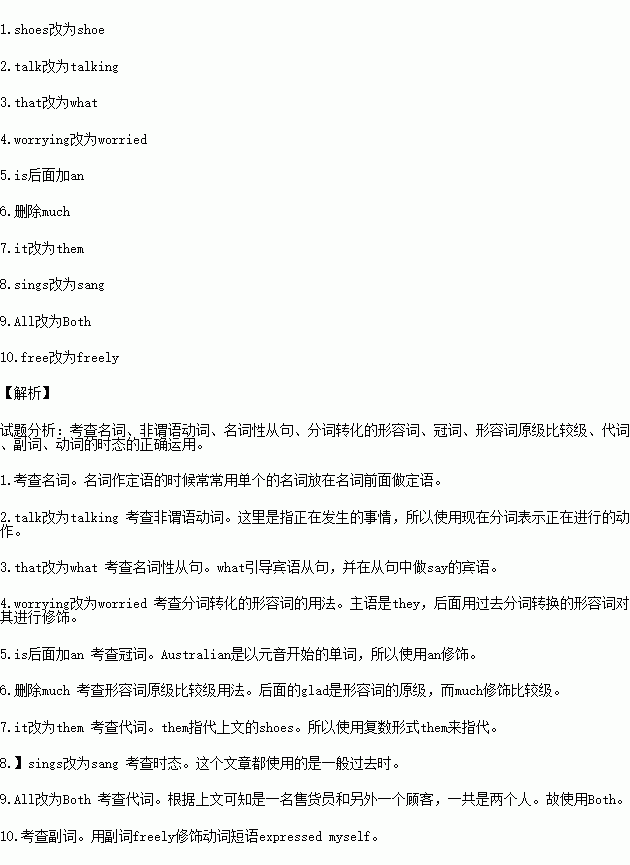题目内容
下面短文中有10处语言错误。请在有错误的地方增加、删除或修改某个单词。
增加:在缺词处加一个漏字符号(∧),并在其下面写上该加的词。
删除:把多余的词用斜线(\)划掉。
修改:在错的词下划一横线,并在该词下面写上修改后的词。
注意:1.每处错误及其修改均仅限一词;
2.只允许修改10处,多者(从第11处起)不计分。
This morning I went to the shoes shop to buy a pair of new shoes. When I got there, I noticed a foreign lady talk to a salesgirl. But the salesgirl didn't understand that the foreigner was saying. They both looked worrying. I went up to help them. The lady is Australian. She wanted to buy a pair of traveling shoes. So I told it to the salesgirl. The lady was very much glad when she took it. She sings high praise for my spoken English. All of them expressed their thanks to me. I felt happy that I expressed myself free in English.
 名校通行证有效作业系列答案
名校通行证有效作业系列答案假如你叫李华,今年暑假即将跨入高三的学习,压力很大,想和父母说说心里话,请你用英文在你的博客上用书信形式表达出来。主要内容如下:
知心话 | 感恩 | 感谢父母的关心、鼓励 |
对父母的期望 | 1. 多加交流2. 适时提供帮助 | |
学习打算 | 考生自拟(至少写两点) | |
注意:1. 短文必须包括所有内容要点,可适当发挥。
2. 词数:120左右(开头与结尾已给出,不计入词数)
Dear Mom and Dad,
With the Senior Three approaching, I really hope to have a heart-to-heart talk with you!
____________________________________________________________________
____________________________________________________________________
____________________________________________________________________
Mom and Dad, I am quite confident about my future. Wish you good health and a happy life.
Yours sincerely,
Li Hua
Aristotle once wrote that “happiness is a state of activity”. In other words, whether you are Seeking life-long satisfaction or a few moments of good cheer, you’ve got to move forward. We’ve interviewed the experts and found five steps to take toward a sunny mood(心情):
Over a 30-year period, University of Illinois researchers asked nearly 120,000 people how income, education, political participation, volunteer activities and close relationships affected their happiness. Reported Newsweek’s Sharon Begley on the findings, “The highest levels of happiness are found with the most stable and satisfying relationships.”
Singing aloud, talking to a stranger, raising your hand: all may increase a feeling of happiness, according to a study from Wake Forest University. Participants(参与者)followed the development of their moods for two weeks and reported feeling happier when they were more outgoing and less happy when reserved or withdrawn.
The editors of forbes.com gave $5 or $20 to 46 strangers by chance. Half the group was told to spend the money on themselves, while the other half was told to spend it on others. Those who’d shared the wealth felt much happier at the end of the day than those who’d spent it on themselves. There was no difference in happiness between those who spent $5 or $20, suggesting that it’s not how much money you spend, but how you spend it, that inspires the spirit.
Studies from the Positive Psychology Center showed that discouraged people who wrote down three good things that happened to them each day for six months reported an improved attitude.
Drinking water really can help keep you cheerful. A small 2012 study from the University of Connecticut suggested that even slight dehydration(脱水) affected the moods of its female participants.
Title | 1._____for Happiness | |
Introduction | You will move2.______in the course of finding happiness. | |
The findings of3._____ | Some4..______toward happiness | |
•Value your relationships | •The5._____happiness lies in the most stable and satisfying relationships | |
•6._____ yourself | •You can gain happiness by singing aloud or talking to others. | |
•Spend money on others | •Your spirit will be inspired by7.____the wealth. | |
•8._____on the positive | •You attitude would be improved when you fix your attention on good things. | |
•Drink water | •If a woman takes in enough water,her9.____of happiness may remain. | |
Conclusion | Happiness can be found if all10._____have been done. | |

